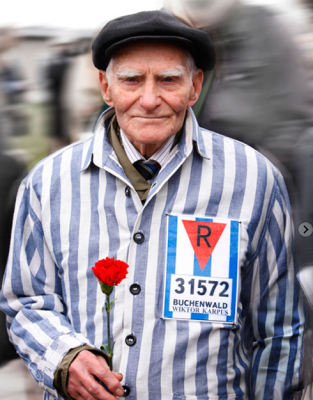Yesterday I experienced a movie that I am going to be thinking about for many days to come. It was about the beauty that can be found even in the darkest places.
The title of the film was Kinderblock 66: Return to Buchenwald. We all know about the despicable acts that occurred during the Holocaust, but it’s nice to be reminded of the courageous acts that were also undertaken to keep Jews safe, just as Schindler in Schlinder’s List did. This film reminds us of both the atrocities and the miracles that occurred during the Holocaust, and it is a firm reminder that we must never forget what happened a mere 70 years ago.
The film was so carefully researched as it documents how nearly 1,000 boys were saved from being burned in the ovens at Buchenwald concentration camp, located near Weimar in Germany. Buchenwald was one of the largest and most well known German death concentration camps. It was hard to get out alive and this film focuses on the ones that did.
Liev Schreiber, one of my favorite actors, lends a brilliant, soothing voice as narrator of the film. The film focuses on four teenage boys who were found in Buchenwald during liberation: Alex Moskovic, Israel-Laszlo Lazar, Pavel Kohn, and Naftali-Duro Furst. Now grown men, they are brought back to the camp to reunite and relive their experience. It’s painful to watch and hear about what they went through. Their memories are so vivid, you feel like they were there yesterday. A few arrived first at Auschwitz-Birkenau after leaving behind their families and were told by the Nazis, “Nobody stays long – you are all leaving through the chimney.” When they got to Buchenwald, they were greeted by dead bodies, which they were required to move. None of these men thought they would get out alive. It seemed impossible. They met children who’d seen their parents go to the gas chamber. Prisoners were shot by guards, forced to perform harsh labor. One after another, we hear their heart-wrenching stories of impending doom and the misery that they were forced to experience. They were put in a bunk with five people to a blanket, they were freezing. It was called Block 66.
But somehow blankets came and they were protected. There was a Communist-led underground at Buchenwald, which many of us have never heard about, and the leader, Antonin Kalina, put his life in danger over and over to save them. The block leaders watched over the children and cared for them, determined to get them out of the camp alive. They strove until the last days of the war and beyond to keep them from danger so they would leave with their lives ahead of them, not behind them.
Kalina counseled the boys to assert, when asked, that they were at least 16 years old, since the Nazis considered anyone younger unfit to do labor. He collected the yellow stars they had been forced to wear, and arranged for classes in math, and even Yiddish, taught by older Buchenwald prisoners. When the SS sought out Jews in Buchenwald to send on marches in cold winter to die, he would explain that no Jews were in the children’s barrack. Some of the children still died from disease, hunger and the harsh conditions of their ordeal. He was a true mensch.
On April 11, 1945, Buchenwald was liberated and they survived.
We see and hear from Kalina in footage from an interview that took place many years ago. He is now deceased but was declared Righteous by Yad Vashem not long ago, and we hear him recounting how he heroically saved these boys’ lives with complete modesty. But the measure of his actions can not be compared as we are reminded of the lives he saved when the men come on screen.
Kinderblock 66: Return to Buchenwald is a well-done documentary that reminds us that we must never forget what happened during these unconceivable times. The four men who relive the time in detail are eloquent and their stories are heart-breaking. The film makers have done an excellent job reliving their stories and it’s hard not to cry hearing about and watching the images on the screen. Each man seems honored to have been invited back to the camp. They all seem to understand the significance of leaving their mark by appearing in such an important piece of history in this film.
Most of the men lost their entire families in the gas chambers, and they are fully aware that they are lucky to be alive. They have lived full lives, many in Israel, one in America.
“We are the embers that did not burn in the great fire,” says Naftali Furst.
Find out more about the film here. I was fortunate enough to have one of the producers, Paul Turlick, come to my synagogue to speak about the film and his hopes for more people to see it.










 Follow
Follow





Speak Your Mind